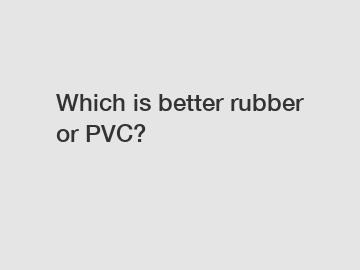Which is better rubber or PVC?
Which is better rubber or PVC?
Rubber and PVC are two commonly used materials in various industries. However, when it comes to deciding which one is better, it largely depends on the specific application and requirements. In this article, we will explore the characteristics, benefits, and limitations of rubber and PVC, to ultimately determine their suitability for different purposes.
When it comes to flexibility and elasticity, rubber outshines PVC. Rubber is a highly elastic material, able to stretch significantly before returning to its original shape. This attribute makes it suitable for applications that require frequent movement, such as rubber bands or rubber gaskets. On the other hand, PVC, which stands for Polyvinyl chloride, offers good flexibility but lacks the same level of elasticity as rubber. PVC is often praised for its resistance to chemicals, oil, and sunlight exposure, making it a popular choice for plumbing pipes and electrical insulation.

In terms of durability, both rubber and PVC have their advantages. Rubber is known for its excellent resistance to abrasion, impact, and tearing, which makes it highly durable in tough environments. This has led to its widespread use in industrial applications, such as conveyor belts or vehicle tires. PVC, although not as resilient as rubber, offers good durability and longevity. Additionally, PVC's low maintenance requirement and resistance to moisture and corrosion make it suitable for outdoor applications, such as window frames or decking.
When considering the cost-effectiveness of these materials, PVC typically has the upper hand. PVC is a cost-efficient material to produce and can be easily molded into various shapes and sizes. Its lower production cost often translates into more affordable products for consumers. On the other hand, rubber tends to be more expensive, especially when it comes to synthetic rubber compounds. However, the lifespan and performance of rubber often justify its higher price point, making it a worthwhile investment in certain applications.
In terms of environmental impact, PVC has been the subject of debate due to the potential release of harmful chemicals during its manufacturing process. However, advancements have been made to improve the sustainability of PVC production, making it a more eco-friendly option. On the other hand, rubber is a natural material derived from latex obtained in a sustainable manner from trees. It is biodegradable and poses fewer environmental concerns. Choosing between rubber and PVC should consider the application and the importance of environmental factors.
In conclusion, the choice between rubber and PVC depends on the specific requirements, budget, and environmental considerations. Rubber offers superior elasticity and durability but tends to be more expensive. PVC, on the other hand, provides good flexibility and cost-effectiveness but lacks the same level of resilience as rubber. Ultimately, the decision should be based on a thorough evaluation of the application's needs and the desired attributes of the material. Both rubber and PVC have their place in various industries, and the optimal choice will vary depending on the specific circumstances.
For more Industrial safety waders, food industry footwear, mens rubber welliesinformation, please contact us. We will provide professional answers.
296
0
0

Comments
All Comments (0)